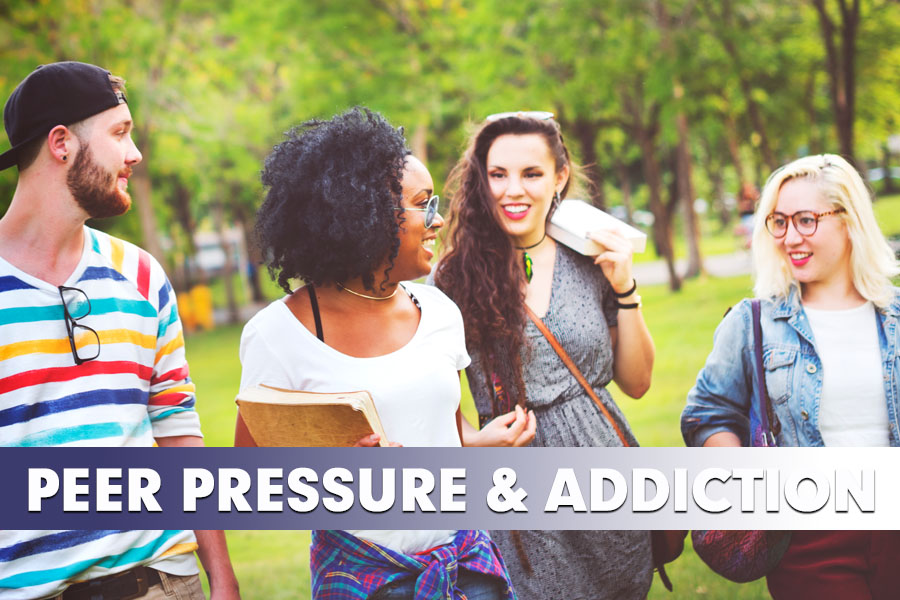What is Peer Pressure?
Peer Pressure is the influence one feels from others in their social group to do something otherwise one would not. A peer could be a friend, colleague, classmate, acquaintance, or a role model.
Peer Pressure may happen directly or indirectly. Direct peer pressure involves peers asking one to do something that normally one would not do. Indirect peer pressure happens when one witnesses others engaging in an activity and are motivated to engage in the same activity because they admire that person.
Peer pressure can be positive or negative. Positive peer pressure could motivate one to exercise and avoid drugs or alcohol.
Where can Peer Pressure Occur?
Peer pressure can occur in the workplace, school, or social media. A report by the National Center on Addiction and Substance Abuse at Columbia University found that 75 per cent of teenagers that were surveyed feel encouraged to drink after seeing images of their peers partying on social media.
Who is Affected by Peer Pressure?
Teenagers are more likely to affected by peer pressure. However, adults can also be influenced, especially when alcohol is involved. Teenagers are more likely to be peer pressured by their peers than adults. However, just like adults, teenagers weigh in the risks and rewards of a certain activity, but more likely to ignore the risks for the reward when their peers are present. This is because their brains’ response to reward are easily stimulated during their teenage years. This attracts teenagers to risky behaviours such as consuming alcohol and drugs, which makes them more vulnerable to peer influence.
Adults are like teenagers; they tend to worry about what others think of them. Adults want to fit in and avoid awkwardness, which makes them pressured to drink alcohol or use drugs either directly or indirectly in social situations where alcohol or drugs are present.
According to a study by the University of Wisconsin, children from single-parent households or blended families are more vulnerable to alcohol consumption and drug use than children with both parent households.
Teenagers with few friends are more likely to influenced by peer pressure.
How to Avoid Peer Pressure?
Individuals should never be pressured to drink alcohol against their own will. Giving in to the temptations of alcohol and drugs can be dangerous for teenagers and adults. Knowing how to turn down an alcoholic beverage or a drug is invaluable.
Ways to Say No to Alcohol and Drugs:
Say “no thank you.”
Change the topic
Suggest a different activity
Get a friend to support your decision
Leave the situation
Say “I am driving home.”
Say “I am the designated driver tonight.”
Say “I have to take care of my children when I get back”
Say “I have to be up early tomorrow morning”
When turning down a drug or an alcoholic drink, one ought to be confident. One can build confidence by practicing what to say in these social situations. Practicing the responses in advance allows the individual to have control in the situation.
To avoid the pressure feeling to drink or use drugs, simply avoid attending activities that involve them. These settings could include, coffee shops, movie theatres, malls, gyms, or your own home.
In social setting, individuals can turn to non-alcoholic beverages as an alterative. For instance, mixing water and juice could give the impression of a mixed alcoholic drink. This helps reduce peer pressure when it comes to alcohol.
Why do People Give into Peer Pressure?
They want to be liked
They want to fit in
They want to rebellious
They want to escape pressure of school and/or work
They want to try something new
What are the Consequences of Saying Yes?
Individuals are more likely to give into peer pressure in social situations and more likely to drink alcohol or use drugs if those around them are doing so. When attending social settings alone, a person’s chances of drinking alcohol or using drugs increases.
Allowing others to make one’s decisions can jeopardize one’s authenticity, self-esteem, happiness, and physical and mental health. This could alienate people from their family members and true friends.
Peers who pressure others to do something against their own will are not likely their friends. Saying yes to them give them power and diminishes other individuals’ powers.
What are the Outcomes of Saying No?
Avoid the effects of alcohol and drugs
Increase chances of arriving home safely
Avoid driving while under the influence of drugs or alcohol
Feeling of more self-control and confidence
Less alcohol and drug consumption could lead to a healthier lifestyle, letting individuals engage in safe activities alongside with friends and family. Avoiding the consequences of alcohol, stressful situations, and negative influences of drugs and alcohol.
It is very common for peers to shame individuals for turning down a drink or a drug. Teenagers are most likely to give into shame compared to adults.
Be Authentic!
Do not be a victim of someone else’s behaviours. Ensure that there is someone to call if you are feeling peer pressured to drink or do drugs in social situations. Plan an escape if the temptation becomes great to you. Your peers should not have control over your decisions, so do not let them. They are not your friend, if they do not respect your choices.
Surround yourself with strong people that respect your decisions. Spending time with friends who resist peer pressure or avoid the consumption of drugs and alcohol will increase your probability of doing the same. The positive influence may be helpful to stay away from alcohol and drugs.
References:

